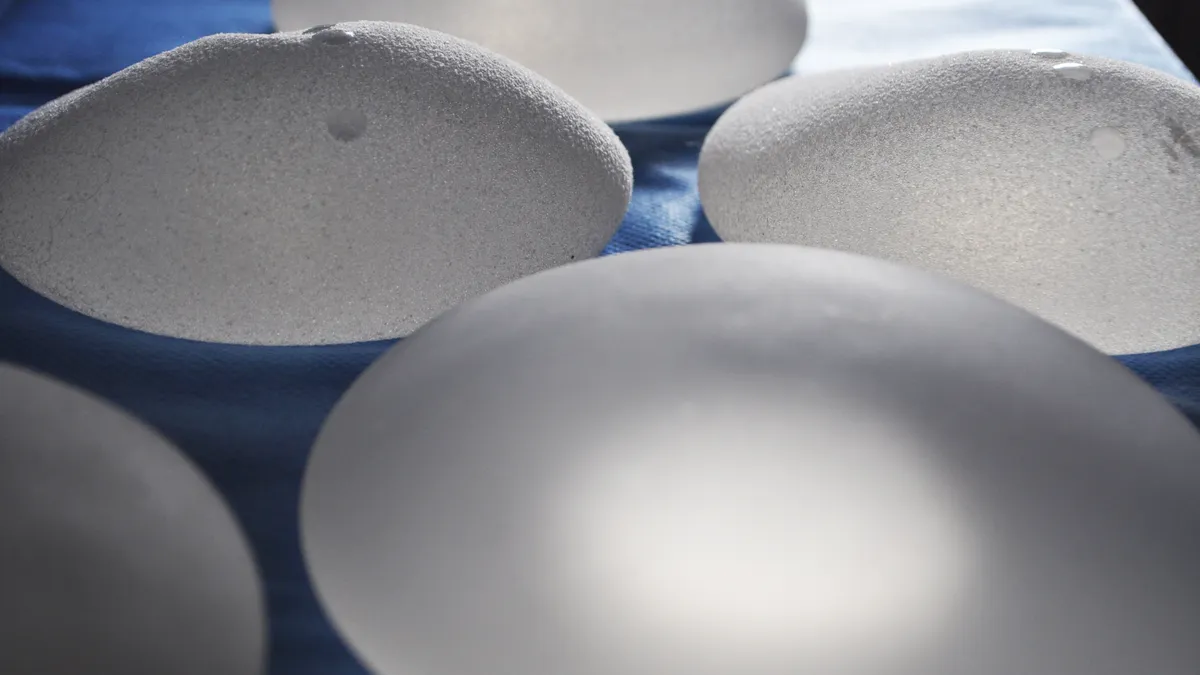Dive Brief:
- Switzerland's medical devices regulatory body published an update Monday on breast implant-associated anaplastic large cell lymphoma (BIA-ALCL) to address the rising number of cases worldwide showing a possible link between use of textured breast implants and the cancer.
- The regulator said it contacted the Swiss Plastic Surgery association to clarify currently available information. The doctors group responded that it recommends use of smooth implants rather than textured where permitted, reaching the same conclusion as French regulators.
- There have been no controlled clinical trials comparing patients with smooth and textured implants, and there is no scientific evidence of a causal relationship between a specific breast implant and development of BIA-ALCL, Swissmedic said.
Dive Insight:
The Swiss regulatory body is the latest national authority to re-examine the risks associated with breast implants. A French scientific committee this month reviewed the use of textured implants in aesthetic and reconstructive surgery and does not recommend preventative removal of the devices, Swissmedic said. But regulators advised individuals who have health concerns relating to breast implants to speak to a medical professional as a matter of urgency.
Manufacturer Allergan suspended sales of its textured breast implants throughout Europe in December following the removal of its CE mark for the products and a compulsory recall in France.
FDA plans to review the benefit-risk profile of the devices on March 25-26 at a public meeting of its General and Plastic Surgery Devices Panel. FDA has said it is monitoring the known risks associated with breast implants, including capsular contracture, implant rupture and BIA-ALCL. In early February, the agency said it had become aware of at least nine patients dying from BIA-ALCL.
Health Canada last week also said it is updating its safety review of breast implants due to a rise in cases of BIA-ALCL, a form of non-Hodgkin lymphoma in which fluid accumulates between the device and surrounding tissue. The Canadian agency said it plans to complete its review by spring.
Both Canadian and U.S. regulators have tied the recent spike in reported BIA-ALCL cases to greater awareness of the implant-associated condition.
A study out last fall from the University of Texas MD Anderson Cancer Center looking at outcomes for more than 100,000 patients put the devices back in the spotlight. The researchers concluded that silicone breast implants are associated with some rare diseases, autoimmune disorders and other conditions. However, a causative relationship was not established, and only one case of BIA-ALCL was reported.
The MD Anderson study was followed soon after by the publication of a critical report on the medical device industry and its regulators by the International Consortium of Investigative Journalists. Persistent health concerns surrounding breast implants were an area of focus.
FDA has defended its record on breast implant safety, as have Allergan and U.S. manufacturer Mentor. The agency in September pointed to a 2011 safety update that found approved silicone gel-filled implants have a “reasonable assurance of safety and effectiveness when used as labeled.” It also launched the National Breast Implant Registry to evaluate real-world safety data.










